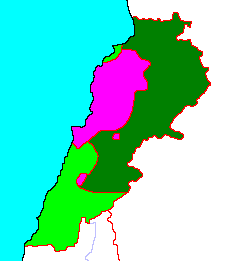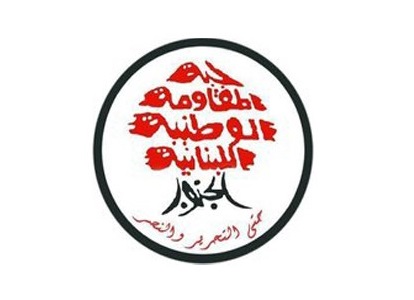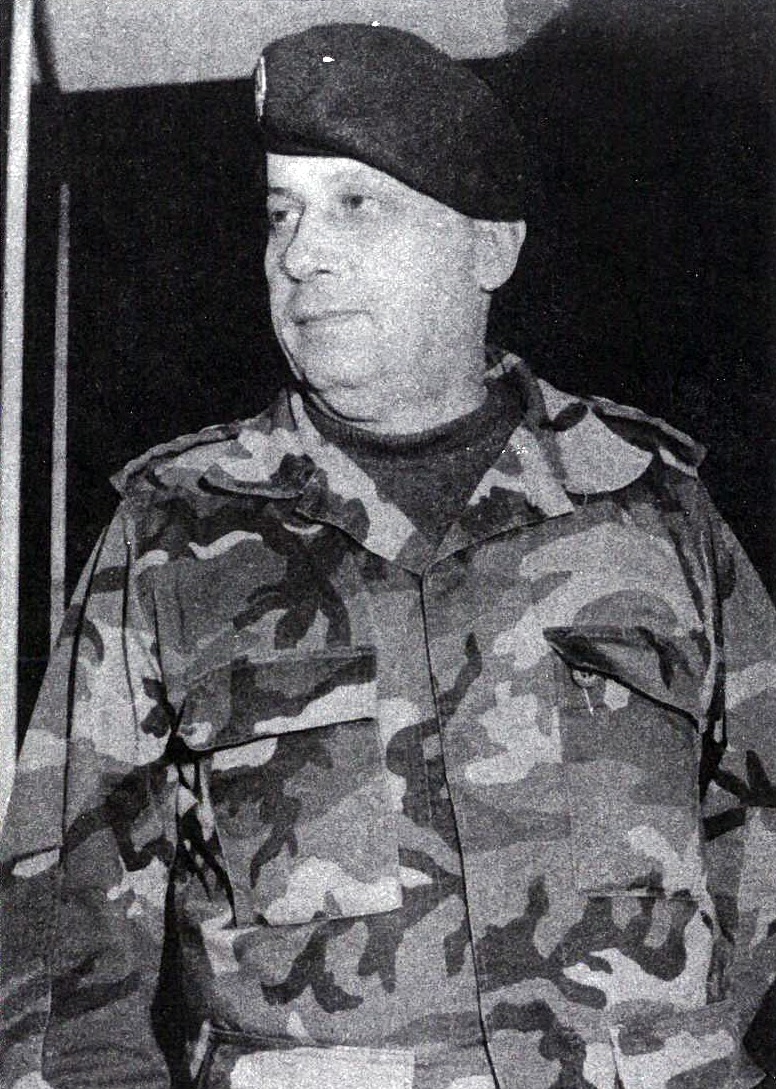|
Syrian Occupation Of Lebanon
The Syrian occupation of Lebanon lasted from 31 May 1976, beginning with the Syrian intervention in the Lebanese Civil War, until 30 April 2005. This period saw significant Syrian military and political influence over Lebanon, impacting its governance, economy, and society. During the occupation, tens of thousands of Lebanese civilians were abducted and forcibly disappeared in Ba'athist Syrian prison camps. The whereabouts of an estimated 30,000 of them remain unknown. The occupation ended following intense international pressure and the assassination of former Lebanese Prime Minister Rafic Hariri. The legacy of the occupation continues to influence Lebanese-Syrian relations and Lebanon's internal political dynamics. Summary In January 1976, Syria proposed restoring the pre-civil war limits on the Palestinian guerrilla presence in Lebanon. This proposal was welcomed by Maronites but rejected by the Palestinian guerrillas. By October 1976, during an Arab League meeting ... [...More Info...] [...Related Items...] OR: [Wikipedia] [Google] [Baidu] |
Syrian Intervention In The Lebanese Civil War
Ba'athist Syria launched a military intervention in the Lebanese Civil War in 1976, one year after the breakout of the war, as Syrian Arab Armed Forces began supporting Maronites, Maronite militias against the Palestine Liberation Organization (PLO) and leftist militias. Syria also raised a proxy militia of its own, the Palestine Liberation Army (PLA). Hafez al-Assad's primary objective was to suppress the rise of PLO and allied pro-Palestinian fedayeen, Palestinian militias in Lebanon which toed a hardline stance against Israel; and the invasion received widespread rebuke in the Arab world. The involvement was later legalized under the pretext of Arab Deterrent Force of the Arab League. In 1982, Syria battled Israel over control of Lebanon. Timeline 1976 Syrian intervention On 22 January 1976, Syrian president Hafez al-Assad brokered a truce between the two sides, while covertly beginning to move Syrian troops into Lebanon under the guise of the Palestine Liberation Army in ... [...More Info...] [...Related Items...] OR: [Wikipedia] [Google] [Baidu] |
Syria (region)
Syria, ( or ''Shaam'') also known as Greater Syria or Syria-Palestine, is a historical region located east of the Mediterranean Sea in West Asia, broadly synonymous with the Levant. The region boundaries have changed throughout history. However, in modern times, the term "Syria" alone is used to refer to the Syria, Syrian Arab Republic. The term is originally derived from Assyria, an Ancient Semitic-speaking peoples, ancient Semitic-speaking civilization centered in northern Mesopotamia, modern-day Iraq. During the Hellenistic period, the term Syria was applied to the entire Levant as Coele-Syria. Under Roman Empire, Roman rule, the term was used to refer to the Roman Syria, province of Syria, later divided into Phoenice (Roman province), Syria Phoenicia and Coele-Syria, Coele Syria, and to the province of Syria Palaestina. Under the Byzantine Empire, Byzantines, the provinces of Syria Prima and Syria Secunda emerged out of Coele Syria. After the Muslim conquest of the Levant ... [...More Info...] [...Related Items...] OR: [Wikipedia] [Google] [Baidu] |
Gamal Abdel Nasser
Gamal Abdel Nasser Hussein (15 January 1918 – 28 September 1970) was an Egyptian military officer and revolutionary who served as the second president of Egypt from 1954 until his death in 1970. Nasser led the Egyptian revolution of 1952 and introduced Land reform in Egypt, far-reaching land reforms the following year. Following a 1954 Attempted assassination of Gamal Abdel Nasser, assassination attempt on his life by a Muslim Brotherhood member, he cracked down on the organization, put President Mohamed Naguib under house arrest and assumed executive office. He was 1956 Egyptian referendum, formally elected president in June 1956. Nasser's popularity in Egypt and the Arab world skyrocketed after his Suez Canal Authority, nationalization of the Suez Canal and his political victory in the subsequent Suez Crisis, known in Egypt as the ''Tripartite Aggression''. Calls for Arab Union, pan-Arab unity under his leadership increased, culminating with the formation of the United Ar ... [...More Info...] [...Related Items...] OR: [Wikipedia] [Google] [Baidu] |
Yom Kippur War
The Yom Kippur War, also known as the Ramadan War, the October War, the 1973 Arab–Israeli War, or the Fourth Arab–Israeli War, was fought from 6 to 25 October 1973 between Israel and a coalition of Arab world, Arab states led by Egypt and Syria. Most of the fighting occurred in the Sinai Peninsula and Golan Heights, territories Israeli-occupied territories, occupied by Israel in 1967. Some combat also took place in mainland Geography of Egypt, Egypt and Northern District (Israel), northern Israel. Egypt aimed to secure a foothold on the eastern bank of the Suez Canal and use it to negotiate the return of the Israeli occupation of the Sinai Peninsula, Sinai Peninsula. The war started on 6 October 1973, when the Arab coalition launched a surprise attack across their respective frontiers during the Jewish holy day of Yom Kippur, which coincided with the 10th day of Ramadan. The United States and Soviet Union engaged in massive resupply efforts for their allies (Israel and the A ... [...More Info...] [...Related Items...] OR: [Wikipedia] [Google] [Baidu] |
Six-Day War
The Six-Day War, also known as the June War, 1967 Arab–Israeli War or Third Arab–Israeli War, was fought between Israel and a coalition of Arab world, Arab states, primarily United Arab Republic, Egypt, Syria, and Jordan from 5 to 10June 1967. Military hostilities broke out amid poor relations between Israel and its Arab neighbors, which had been observing the 1949 Armistice Agreements signed at the end of the 1948 Arab–Israeli War, First Arab–Israeli War. In 1956, regional tensions over the Straits of Tiran (giving access to Eilat, a port on the southeast tip of Israel) escalated in what became known as the Suez Crisis, when Israel invaded Egypt over the Israeli passage through the Suez Canal and Straits of Tiran, Egyptian closure of maritime passageways to Israeli shipping, ultimately resulting in the re-opening of the Straits of Tiran to Israel as well as the deployment of the United Nations Emergency Force (UNEF) along the Borders of Israel#Border with Egypt, Egypt ... [...More Info...] [...Related Items...] OR: [Wikipedia] [Google] [Baidu] |
Middle East
The Middle East (term originally coined in English language) is a geopolitical region encompassing the Arabian Peninsula, the Levant, Turkey, Egypt, Iran, and Iraq. The term came into widespread usage by the United Kingdom and western European nations in the early 20th century as a replacement of the term Near East (both were in contrast to the Far East). The term "Middle East" has led to some confusion over its changing definitions. Since the late 20th century, it has been criticized as being too Eurocentrism, Eurocentric. The region includes the vast majority of the territories included in the closely associated definition of West Asia, but without the South Caucasus. It also includes all of Egypt (not just the Sinai Peninsula, Sinai) and all of Turkey (including East Thrace). Most Middle Eastern countries (13 out of 18) are part of the Arab world. The list of Middle Eastern countries by population, most populous countries in the region are Egypt, Turkey, and Iran, whil ... [...More Info...] [...Related Items...] OR: [Wikipedia] [Google] [Baidu] |
Civil War Lebanon Map 1976a
Civil may refer to: *Civility, orderly behavior and politeness *Civic virtue, the cultivation of habits important for the success of a society *Civil (journalism) ''The Colorado Sun'' is an online news outlet based in Denver, Colorado. It launched on September 10, 2018, to provide long-form, in-depth coverage of news from all around Colorado. It was started with two years of funding from blockchain ventu ..., a platform for independent journalism * Civil (surname) See also * {{Disambiguation ... [...More Info...] [...Related Items...] OR: [Wikipedia] [Google] [Baidu] |
Special Tribunal For Lebanon
The Special Tribunal for Lebanon (STL), also referred to as the Lebanon Tribunal or the Hariri Tribunal, was a tribunal of international character that was active between 2009 and 2023. It applied Lebanese criminal law under the authority of the United Nations to carry out the investigation and prosecution of those responsible for 14 February 2005 assassination of Rafic Hariri, the former Lebanese prime minister, and the deaths of 21 others, as well as those responsible for connected attacks. The Tribunal officially opened on 1 March 2009 and had primacy over the national courts of Lebanon. The Tribunal sat in Leidschendam, on the outskirts of The Hague, Netherlands, and had a field office in the Lebanese capital, Beirut. Its official languages were Arabic, French and English. The Tribunal was unique among international criminal tribunals in that it had the right to hold trials '' in absentia'', and it was the first to deal with terrorism as a distinct crime. (All of the def ... [...More Info...] [...Related Items...] OR: [Wikipedia] [Google] [Baidu] |
Cedar Revolution
The Cedar Revolution (), also known as the Independence uprising (), was a chain of demonstrations in Lebanon (especially in the capital Beirut) triggered by the assassination of former Lebanese Prime Minister Rafic Hariri. The popular movement was remarkable for its avoidance of violence, peaceful approach, and its total reliance on methods of civil resistance. The primary goals of the activists were the withdrawal of the Syrian troops which had occupied Lebanon since 1976, the replacement of a government heavily influenced by Syrian interests by more independent leadership, the establishment of an international commission to investigate the assassination of Prime Minister Hariri, the resignation of security officials to ensure the success of the plan, and the organization of free parliamentary elections. More generally, the demonstrators demanded the end of the Syrian influence in Lebanese politics. At the start of the demonstrations, Syria had a force of roughly 14,000 so ... [...More Info...] [...Related Items...] OR: [Wikipedia] [Google] [Baidu] |
UN Security Council Resolution 1559
United Nations Security Council resolution 1559, adopted on 2 September 2004, after recalling resolutions 425 (1978), 426 (1978), 520 (1982) and 1553 (2004) on the situation in Lebanon, the Council supported free and fair presidential elections in Lebanon, urging the Lebanese government to establish control over its territory, disarm militias like Hezbollah, and facilitate the withdrawal of any remaining foreign forces from the country. Nine countries voted in favor: Angola, Benin, Chile, France, Germany, Romania, Spain, the United Kingdom, and the United States. Six countries abstained: Algeria, Brazil, China, Pakistan, the Philippines and Russia. The resolution was sponsored by France and the United States. The cooperation between these two nations on an issue concerning the Middle East was seen as a significant improvement in their relationship, compared to their earlier bitter disagreement over the 2003 invasion of Iraq. Because Lebanon was governed by France as a League ... [...More Info...] [...Related Items...] OR: [Wikipedia] [Google] [Baidu] |
War Of Liberation (1989–1990)
The War of Liberation (Arabic: حرب التحرير) was a sub-conflict within the Lebanese Civil War#Fourth phase (1984–1990), final phase of the Lebanese Civil War between 1989 and 1990, in which the Lebanese Armed Forces, Lebanese Army loyal to General and Prime Minister of Lebanon, Prime Minister Michel Aoun, appointed by previous President Amine Gemayel and headquartered in eastern Beirut, fought against the western Beirut-based Syrian Armed Forces and the Lebanese Army loyal to President of Lebanon, President Elias Hrawi and Prime Minister Salim Al-Huss, appointed by the Taif Agreement. Aoun launched several offensives against the Lebanese Forces in an attempt to establish his authority over East Beirut. The conflict culminated on 13 October 1990, when the Syrian Army stormed Baabda Palace and other strongholds of Aoun, killing hundreds of Lebanese soldiers and civilians and ousting Aoun, marking the end of the Lebanese Civil War. Aoun survived and moved to France to live ... [...More Info...] [...Related Items...] OR: [Wikipedia] [Google] [Baidu] |
United Nations Security Council Resolution 520
United Nations Security Council resolution 520, adopted unanimously on 17 September 1982, after the assassination of Lebanese President Bashir Gemayel and reaffirming resolutions 508 (1982), 509 (1982) and 516 (1982), the Council demanded that Israel withdraw immediately from Lebanon, and that Lebanese sovereignty be respected in order to restore a stable government in Lebanon. The resolution went on to demand the return of positions occupied by Israel before 15 September 1982, as a first step towards the full implementation of the resolution. It also reaffirmed resolutions 512 (1982) and 513 (1982) which call for respect for the rights of the civilian populations without any discrimination and repudiates all acts of violence against those populations. The Council supported the efforts of the Secretary-General to implement Security Council resolution 516 (1982) concerning the deployment of United Nations observers to monitor the situation in and around Beirut, requesting all ... [...More Info...] [...Related Items...] OR: [Wikipedia] [Google] [Baidu] |








